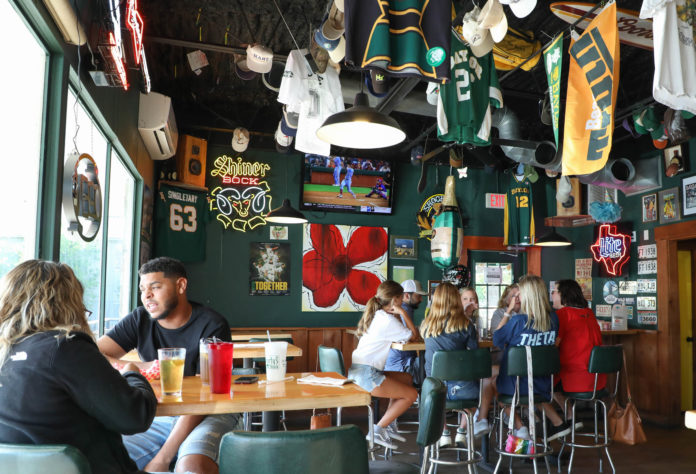
By Ava Dunwoody | Staff Writer
Small businesses like Shorty’s Pizza Shack in Waco are bouncing back with the return of students after COVID-19-induced economic turmoil. In a city that suffers when Baylor is out of session, the extended three months of quarantine proved especially difficult.
Bob Woodard, shareholder at JRBT, a Waco-based accounting firm, and adjunct lecturer at Baylor’s Hankamer School of Business, works with companies in and around Waco on accounting and tax returns. He said about 90% of his clients are local businesses.
“The last five months for many of my clients have really been a struggle. Baylor students spend a lot of money and they are big customers,” Woodard said. “We are used to it in June and July, but to have those extra months was really though.”
Ted “Shorty” Browning, Baylor graduate and founder of Shorty’s Pizza Shack located at 1712 S 12th St. is an example of a local business owner who felt the impact of COVID-19 in his company. Nine years after opening the restaurant in 2011, he was among the almost 7.5 million small businesses around the country who were worried about having to shut down.
“That first month was awful,” Browning said. “It got scary. We can adapt pretty well because we are small, but we were about two days away from essentially letting everyone go and having three employees.”
Luckily, Browning said, things began to turn around. He and Kyle Ferguson, his business partner, attribute this to the Waco community and to other local businesses that have become “Waco staples” that “make the city what it is.”
Browning recounts how when they were just getting started, Food For Thought, another local business, often lent them flour when they ran out. Leah Stewart, owner of The Olive Branch at 215 S. 2nd St., let Shorty’s Pizza Shack use their mixer when Browning’s was broken.
Shorty’s Pizza Shack returns the favor by doing the same for local joints as needed. When another restaurant’s freezer broke, Shorty’s let them use their extra space for a few days.
“We try to help each other out,” Browning said. “You can’t make it in this business without having friends like that. A corporate place isn’t gonna let me use their mixer but a local place would.”
Another significant aid to local business is Baylor students. Woodard has lived in Waco for 19 years and has witnessed what he said is “phenomenal” growth in the city. A lot of this, he said, is because students are transforming Waco into a place people want to be.
“When the Baylor students are back, all boats rise because there is more activity, more spending, more energy,” Woodard said. “The energy that this university gives the city is incredible.”
Browning used an analogy he heard from another Waco business owner to describe the impact of the Baylor community.
“The Waco customers are the sundae and the Baylor students are the cherry on top,” he said. “You have to be able to survive the summer, but it makes a huge difference when they come back, not only financially, but in terms of the vibrancy of the city and seeing young people around.”
When students support local business, the overall economy of the city benefits as well. Local businesses — through paying wages, buying local goods and services or contributing to local nonprofits — are more likely to keep money circulating in the community. A study of Grand Rapids, Mich., by the Michigan State University Center for Community and Economic Development found, $73 out of $100 stayed within the community when spent locally as opposed to $43 when spent at a corporation. Similar factors are at play in cities around the country, including Waco.
“The more we can shop local here, the more we support our own people in our own community,” Woodard said. “Not only do the employees make the money, but the profits stay in our community.”
In addition to fiscal profit, Browning believes that there is something unique about small businesses that cannot be replicated by large chains.
“I think there is something to be said about the individuality of the place you are going,” Browning said. “There’s only one Shorty’s. There’s only one place with my old flip flops hanging off a rafter. You just can’t get it anywhere else.”





